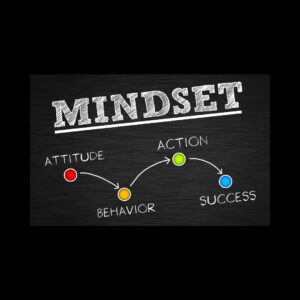Setting goals is a great practice. Goals help to get you focused, organized, and give you something tangible to work toward. I personally set short-term, medium-range, and long-term goals. I also have changed, or adjusted, some of my goals–especially the long-term ones. And just like I think it’s ok to change goals, I don’t think there’s anything wrong with changing your personal finance goals.
What seemed like a worthy personal finance goal seven years ago may no longer be important to you and your family. Or a goal you never even thought about setting years ago, might become important. This post will outline changing your personal finance goals–including the why, how, and mindset behind it.
Growth Mindset
Before we get too deep into changing your personal finance goals, it’s important to talk about growth mindset. Growth mindset gives us permission to change and get better. To go even further, it’s more than permission to change–it’s encouragement to do so.
Growth mindset applies to all areas of life, not just personal finance. Having a growth mindset helps with physical fitness, overall mindset, personal finances, relationships, and multiple other areas of life. It’s a way of thinking that encourages you to get better and improve. It’s the opposite of a fixed mindset.
Let’s take someone who has not been the greatest with money. With a growth mindset, he will (among other things):
- Tell himself that he will improve
- Find ways to improve like by getting a money coach, reading personal finance books, talking with financially successful people, etc.
- Set goals and create metrics to show improvement
- Use positive self-talk
The premise behind the growth mindset is that things will get better, there’s room for improvement, and that the situation is not static. It’s empowering because it gives us the ability to make choices and changes.
Recommended Reading: Growth Mindset by Carol Dweck
New Opportunities Present Themselves
As we learn and grown, new opportunities present themselves. Opportunities that we never thought about, never knew existed, or never thought possible. When this happens, it’s natural to change your personal finance goals.
For example, someone who had an original goal of retiring at 65 with no house payment might read a book or listen to a podcast that changes their outlook. Maybe it’s a book about early financial freedom like Retire Young, Retire Rich. Or maybe a guest on a podcast changed their paradigm.
An individual in this position probably thought retiring at 65 with no house payment was the right decision for him. But as he learned more, he realized he could retire earlier by making different investments, saving more money, and even taking on a side hustle. All opportunities he didn’t necessarily know about when making the original goal.
To continue this example, maybe this person originally thought he’d only be able to earn four to five percent in his investments. But later learned he could make 10 percent or more by adjusting his portfolio. That’s a big change to his investments and would take years off his original plan.
We Meet New Intelligent People
Similar to the last section, meeting new and intelligent people is one of the best ways to create new opportunities. And that will likely prompt you to change your personal finance goals.
Jim Rohn said “you are the average of the five people you spend the most time with.” As we meet new people–we listen to their ideas, watch what they do, ask questions, and learn. When this happens, it’s almost impossible not to adjust or even revamp some of your old goals.
For example, if we meet new people who are very physically fit, we probably are going to change our fitness goals. Meeting a communication expert will likely prompt you to change the way you communicate. And meeting a financially successful person will likely induce a change to your personal finance goals.
Career Change
A new career can change your personal finance goals. This can happen in a few different ways. The first is the obvious way–when a new career equals more money. More money is a big motivator for a lot of people, and one of the primary reasons someone would want to change careers.
There are other reasons to change careers, and they don’t always involve more money or what most people would think of as a job upgrade. Those include:
- A career with less stress
- Reduction in hours
- New challenges and opportunities, but less money
- Pursuit of a passion
A career change that results in less money would likely trigger a change to anyone’s personal finance goals. That’s not necessarily a bad thing, but it is a change.
For example, a corporate executive in her early 50’s who originally planned on retiring when she was 58 or 59 takes a job with less stress. It’s also more of a passion project. This job doesn’t pay nearly the same as her corporate job, so she changes her goal of retiring at 58 or 59 and changes it to her mid 60’s.
This isn’t a bad thing–it’s actually a good thing. But it is a change to her personal finance goals.
Interests Change
It’s natural to change your personal finance goals as your interests change. We all go through phases in life where we become interested in something new. Then the enthusiasm wanes and we move on to something else. This is a natural part of life, I think we all go through it.
For example, someone who becomes more interested in traveling the world will either need to find an inexpensive way to do it or change their income stream. Which likely involves adjusting their personal finance goals to increase their income for travel. That can involve making more money or eliminating costs in other areas.
Either way, additional income is needed for travel–prompting a change to your personal finance goals. A change in interests is a normal and predictable part of life, and something that should be embraced, not resisted.
Inevitable Life Changes
As I’m in my early 40’s, one thing I’ve learned is that life changes. It’s inevitable. Life changes as we grow, meet new people, acquire new interests, along with a variety of other completely unpredictable factors. As life changes, your personal finance goals often change with it.
- Kid gets accepted into an Ivy League school: your personal finance goals change
- Opportunity to live abroad for a year: goals change
- Unexpected investment opportunity: change in goals
- Unexpected large expense: another recalibration of goals
A list like this could go on and on, but you get the point. Things change, new opportunities develop. We don’t know when they are going to come, but we do know they will.
Solution: Create a Plan That Allows for Change
Since we know life changes, there is a solution that will address the majority of those changes. Of course there is no perfect solution, but we can come close. By following certain principles, we can adjust as those changes come our way. Principles like:
- Having a high savings rate
- Investing wisely and consistently
- Paying yourself first
- Living below your means
These principles can’t provide a guarantee (just like nothing in life can), but it comes close. No matter what happens in life, paying yourself first is always a good idea. So is having a high savings rate. As is investing wisely and living below your means.
As long as these principles are part of your personal finance plan, other adjustments can be made more smoothly. Using the same example as earlier in this post, if you suddenly get an opportunity to work abroad, it’s a lot easier to change your personal finance goals if you have been following the important core principles. It might extend your working years, but a solid foundation has already been set by following the principles.
Core Values Don’t Change
As much as life changes, core values don’t. Some of my core values:
- Family
- Relationships
- Personal development
- Health and fitness
No matter what happens in life–where I live, what kind of work I do, or what my interests are–the core values don’t change. I could switch hobbies from photography to hiking, golf to underwater basket weaving, or anything else imaginable, and it won’t change my core values. The small things change but the big things don’t.
A personal finance plan developed around those core values is much more likely to succeed than anything else I can come up with.
Conclusion
It’s ok to change your personal finance goals. In fact, it’s often a sign of growth. I myself have changed my goals over time as I’ve evolved, met new people, and learned new things. Goals are not static, they are constantly evolving.
So keep learning and developing. And allow yourself to set new goals, and more new goals. As long as the goals fall within your core values, you’ll be on the path to bigger and better things.
What personal finance goals have you changed over the years?











